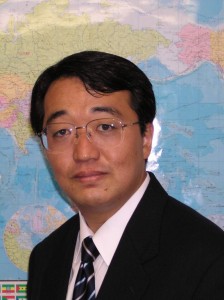緊張と統合:内村鑑三におけるキリスト教と日本の精神
このシリーズでは、私が1994年に執筆した統一神学大学院(Unification Theological Seminary)の神学課程修士論文(Divinity Thesis)を日英二か国語で掲載している。
6.無教会と日本社会の続き
C.不敬事件後の内村
不敬事件後の内村の生活は悲劇的であった。彼は肺炎をわずらい、彼の妻は夫の看病と社会からの激しい迫害の故に過労で亡くなった。官営の学校で起こった事件は、彼が今後公職に就く可能性を奪ってしまった。彼は全てを失い、貧困に苦しんだ。結果的に彼は文筆活動によって生計を立てる決意をした。何年かの貧困生活が続いた後、彼は『万朝報』という新聞の編集長となったが、彼は後にそれを日本最大の日刊紙とした。
彼は、その愛国主義から当初日清戦争(1894ー1895)を正当化した。彼は無邪気にも、この戦争の目的は中国を暗黒の文明のくびきから解放することにあると信じたのである。しかし彼は日本軍の略奪行為にひどく失望し、政府と国家がこの戦争を富の獲得と朝鮮国の抑圧の為の手段にしたことを非難したのである。彼はその天職を果たすことが出来ないでいる、愛する母国に対する怒りに燃えた。
内村は受けの良いジャーナリスティックな論調に転じ、鋭い皮肉のきいたペンで国家の指導者達を攻撃した。そのようなジャーナリスティックな論調は、急激に内村の名声と人気を向上させた。彼の頑固な独立精神と原則に対する忠実さは、彼のみごとな風刺、皮肉、およびウィットのスタイルと相まって、彼の「預言者」あるいは明治政府に対する道徳的、社会的、政治的な批評家としての位置を不動のものにした。
1903年、日露戦争勃発の直前に、彼は公然と非戦論を宣言し、前にも増してこの戦争に反対した。しかし『万朝報』のオーナーは、来るべき戦争を広く世論が支持していたために、政府の軍事的な準備を支援することにした。そのような戦争を支持することは内村の良心が許さなかった。特に先の日清戦争を支持した屈辱的な経験の後であったために、彼は『万朝報』のスタッフを辞任したのである。かくして彼の人生は孤独感にさいなまされる日々となった。彼はこの不義なる日本において義なる生活をしようと思えば、孤独は避け得ないものであることを悟ったのである。
彼の孤独は預言者の孤独であった。彼の最も好んだ預言者はエレミヤであった。内村はエレミヤ書について多くの講義をしている。ちょうどイスラエルの人々が誰もエレミヤの言葉に耳を貸さなかったように、内村の愛する母国に対する言葉は完全に誤解された。彼は呪われ、迫害され、そして絶望した。彼は日本を裁くようになった。同様に、イスラエル史の舞台をかつて踏んだ者で、預言者エレミヤほど勇敢、しかも悲劇的な人物もなかった。彼の役目は、ユダが滅亡に定められていること、また、そうした運命は彼らの罪のゆえに下されるヤハウェの正しい審判であることを、長い生涯をとおして繰り返し語ることであった。彼はエルサレムの陥落を預言したために、反逆罪に問われた。彼は憎まれ、あざけられ、排斥され、絶えず苦しめられ、一度ならず殺されようとした。彼は人々の罪を非難し、彼らに下される審判を宣告したが、彼は自分の民と国家を実は誰よりも愛していたのである。彼は人々が悔い改めることを望んでいた。しかしそれは結局無駄であった。そして審判が実際に来た時、彼は絶望の涙に暮れたのである。時代は彼を理解し得なかったのである。こうしてみれば、内村が自分の使命を預言者エレミヤになぞらえて悟ったというのも不思議ではない。
VI. Mukyokai and Japanese Society. (Cont.)
C. Uchimura After the Lese Majesty Incident.
Uchimura’s life after the Lese Majesty Incident was tragic. He got pneumonia and his wife passed away from the fatigue caused by nursing her husband and by the severe persecution from society. The affair in a government school cost him the possibility of further official employment. He lost everything and suffered from poverty. As a result, he determined to live by writing. After several lean years, he became the editor of a newspaper Yorozu Choho, that he was to make into Japan’s largest daily.(22)
His patriotism pushed him to justify the Sino-Japanese War (1894-1895) in the beginning, because he naively believed that the goal of the war was to liberate China from the yoke of dark civilization. However, he was strongly disappointed by the plundering of the Japanese army and accused the government and nation of making the war a means to gain wealth and an occasion to oppress the Koreans. He came to burn with anger at his beloved mother country which could not fulfill her heavenly mission.(23)
Uchimura turned to popular journalistic writing and with a sharp satirical pen attacked the national leadership. Such journalistic writing also suddenly thrust Uchimura into fame and popularity. His uncompromising independence and loyalty to principle along with his grand style of satire, irony and wit established him as a “prophet,” a moral, social and political critic of the Meiji establishment.(24)
In 1903, immediately before the onset of the Russo-Japanese War, he proclaimed an outspoken pacifism and opposed this war as much as the former. However, the owner of the Yorozu Choho chose to back the government in its militaristic preparations, because of the broad public support of the coming war. Since Uchimura could not in good conscience support such a war, especially after his humiliating experience of supporting the earlier Sino-Japanese war, he resigned from the staff of the Yorozu choho. Thus, his life was overwhelmed by a feeling of isolation. He realized that solitude was inevitable if he wished to live a righteous life in this unrighteous Japan.(25)
His solitude was that of the prophets. His favorite prophet was Jeremiah. Uchimura gave many lectures on the Book of Jeremiah.(26)Just as no Israelite listened to the words of Jeremiah, Uchimura’s words for his beloved country were totally misunderstood. He was cursed, persecuted, and despaired; he came to judge Japan. Likewise, no braver or more tragic figure ever trod the stage of Israel’s history than the prophet Jeremiah. It was his lot through a long lifetime to say, and say again, that Judah was doomed and that doom was Yahweh’s righteous judgment upon her for breach of covenant. Since he prophesied the fall of Jerusalem he was accused for treason. He was hated, jeered at, ostracized, continually harassed, and more than once almost killed. While he condemned people’s sins and pronounced judgment upon them, he loved his people and his country; he wanted them to repent. However, it was in vain; when the judgment actually came, he wept in despair. The age could not understand him. It is not surprising that Uchimura realized his mission was analogous to the prophet Jeremiah.(27)
(22)op cit, Ebisawa and Ouchi, p.380-1.
(23)op cit, Shin Ohara, p.215-248.
(24)op cit, Robert Lee, p.103.
(25)op cit, Ebisawa and Ouchi, p.382.
(26)op cit, Norihisa Suzuki, Vol.2, p.52.
(27)op cit, Ebisawa and Ouchi, p.384.
